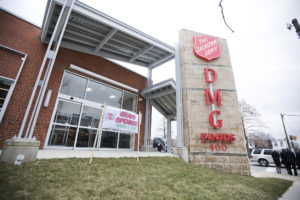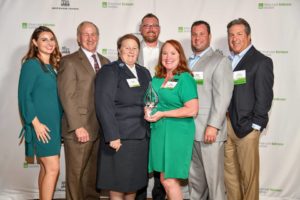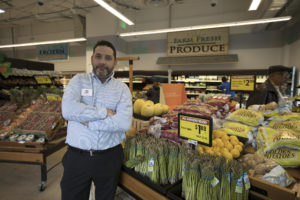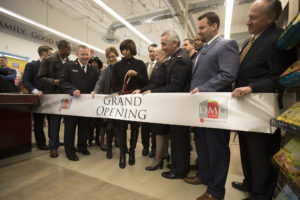 The ULI Baltimore Wavemaker Awards is an annual event to honor Maryland’s most successful real estate developments. This year’s 10th Annual ULI Baltimore Wavemaker Awards, were held on October 4, 2018 at The Winslow Parker Metal Building. Of the 30 nominations for the awards, only 8 transformational projects in the Baltimore area were selected. DMG Foods, an innovative non-profit grocery store in northeast Baltimore, designed to provide healthy and affordable food for all members of the community, was one of these 8 winners. To read more about the project, see Lorax’s nomination of the project below.
The ULI Baltimore Wavemaker Awards is an annual event to honor Maryland’s most successful real estate developments. This year’s 10th Annual ULI Baltimore Wavemaker Awards, were held on October 4, 2018 at The Winslow Parker Metal Building. Of the 30 nominations for the awards, only 8 transformational projects in the Baltimore area were selected. DMG Foods, an innovative non-profit grocery store in northeast Baltimore, designed to provide healthy and affordable food for all members of the community, was one of these 8 winners. To read more about the project, see Lorax’s nomination of the project below.
Additional congratulations go to Nelson Kohl Apartments, 1405 Point, SNF Parkway, Porter Street Apartments, 500 Park, 1 West Mt. Vernon Place, and 706 Giddings Avenue. Read more about the award ceremony here.

Pictured above is the DMG Foods project team accepting the 2018 ULI Wavemaker Award. From left to right: Krystal O’Hara (Lorax Partnerships), Mark Banta (Banta Campbell Architects), Peggy Vick (Salvation Army), Matthew DeGourse (Harkins Builders), Amy Middleton (Salvation Army), Mark Tillotson (Harkins Builders), and Gary Garofalo (Harkins Builders)
ULI Wavemaker Awards Nomination
 Today, young people throughout our urban communities develop lifelong illnesses due to poor nutrition and eating practices. Lack of education and access to fresh and healthy food often drives families to shop at high priced convenience stores; in turn precious, limited, financial resources must be used to purchase less healthy food and commonly results in a lifetime of nutrition related illnesses. In Baltimore City today, The Salvation Army has again purchased an old warehouse with the intent of changing an industry forever.
Today, young people throughout our urban communities develop lifelong illnesses due to poor nutrition and eating practices. Lack of education and access to fresh and healthy food often drives families to shop at high priced convenience stores; in turn precious, limited, financial resources must be used to purchase less healthy food and commonly results in a lifetime of nutrition related illnesses. In Baltimore City today, The Salvation Army has again purchased an old warehouse with the intent of changing an industry forever.
In 2015, the death of Freddie Gray sparked an uprising in Baltimore City. This uprising brought on looting and vandalizing of many of the convenience stores families in Baltimore depended on as a primary source of food. The Salvation Army of Central Maryland responded by providing food baskets to as many families as possible, but the demand was too great and the program was unsustainable. The need was so critical that The Salvation Army of Central Maryland considered opening a small client-choice food pantry in partnership with the Maryland Food Bank, and possibly incorporating a small area where clients could purchase a limited number of additional healthy food items. As ideas were taking shape, Major Gene Hogg was approached by the Food Retail Economic Development Officer from the Baltimore Development Corporation who informed him about the food desert crisis in Baltimore City. From there, DMG Food, named for the Salvation Army’s moto “Doing the Most Good,” was born.
 DMG Foods grocery store is an innovative social enterprise solution to Baltimore City’s chronic food insufficiency. Situated on the edge of a food desert (re-branded food priority area by Mayor Catherine Pugh just prior to the grand opening), DMG Foods aims to provide a clean, affordable place for residents of the local community to purchase fresh and healthy food and expand their cash or food stamp dollars through nutrition and smart spending education, wrap around social service offerings, and supplemental food items provided at no cost. DMG will also serve to address the need for specialized training opportunities in the grocery industry through a workforce development program and partnership agreements with several area supermarket chains. Ultimately, DMG Foods is a self-sustaining social service program designed not just to fill a gap in an urban community in critical need, but to meet the needs of each member of the community with dignity through a unique approach.
DMG Foods grocery store is an innovative social enterprise solution to Baltimore City’s chronic food insufficiency. Situated on the edge of a food desert (re-branded food priority area by Mayor Catherine Pugh just prior to the grand opening), DMG Foods aims to provide a clean, affordable place for residents of the local community to purchase fresh and healthy food and expand their cash or food stamp dollars through nutrition and smart spending education, wrap around social service offerings, and supplemental food items provided at no cost. DMG will also serve to address the need for specialized training opportunities in the grocery industry through a workforce development program and partnership agreements with several area supermarket chains. Ultimately, DMG Foods is a self-sustaining social service program designed not just to fill a gap in an urban community in critical need, but to meet the needs of each member of the community with dignity through a unique approach.
COMPLETENESS – A project must be substantially complete and financially viable. A program and/or process (i.e. growth management strategy or publicly guided development program) must be fully implemented and must be a sound investment of private and/or public funds in terms of their success in transforming communities and neighborhoods.
The DMG Foods store has been open and in operation since the grand opening on March 7, 2018, attended by members of the community as well as Mayor Catherine Pugh and other local officials.
The success of the concept requires a three-pronged foundation: First, organizational ownership of a mid-sized warehouse or suitable building; this immediately eliminates a large portion of overhead costs for-profit models must bear. The 7,338 SF fit-out of the existing 27,382 GSF Salvation Army Warehouse is currently, and will continue to be, used for the storage of donated items. During the holidays, and other specific times throughout the year, volunteers use this space to organize and package donations for events and distribution.
Second, secured funding to cover the cost of construction and equipment, a full-stock inventory, and one full year’s operating budget. Funding was sources from the Harry and Jeanette Weinberg Foundation, France Merrick Foundation, as well as major private donors.
Third, a robust partnership with a state or large local food bank and collaboration with surrounding community and social service organizations to ensure a variety of social service offerings, including a feeding program to absorb the cost of inventory overstock and spoilage. With these three components secured, the DMG Foods model is replicable to scale in nearly any community in critical need.
Sales Forecast
As an alternative non-profit grocery store, The Salvation Army expects to gross 1/3 of what a traditional grocery store would in the same space. The sales are based on 1/3 of the industry standard estimated by the Food Marketing Institute (FMI). In 2014, the industry standard was $11.98 per square foot (current store size: 7,338 square feet x $11.98 / .333) for the annual and weekly sales estimate. They expect sales to grow at least 5-7% per year.
A SENSE OF PLACE AND QUALITY – The project reflects the special characteristics of the locality, community, and region in which it is located OR creates an inspiring environment that becomes an important anchor of the surrounding community. In addition, the project shall achieve a high standard of excellence in all areas – design, construction, economics, marketing, and management.
CONSULTANTS
The Salvation Army of Central Maryland hired a market analyst to conduct a feasibility study of the surrounding area of the property the Salvation Army already owned. Matthew P. Casey & Associates studied the Primary Trade Area and determined the sustainability of a ~6,000-sq. ft. market. Once the consultant projected an estimated gross sales amount, The Salvation Army of Central Maryland was able to create a budget and sales strategy. The Salvation Army team then interviewed grocery wholesalers and chose to hire C & S Wholesale Grocers, the largest wholesale grocery supply company in the nation. C & S Wholesale Grocers conducted their own feasibility study and it aligned with the Matthew Cassey study. Once the team was confident in the store’s sustainability they were able to move forward with a capital campaign to raise money for the store renovations.
COMMUNITY ASSOCIATIONS
The Salvation Army of Central Maryland met with four of the surrounding area’s community associations. These organizations represent over 40,000 individuals and 15,000 residential homes within a quarter mile radius of the store. Initially, there was some push back because of their concerns of additional traffic, parking, and what types of clients that were being served at this location. After many meetings and reassurance that the store is available to all customers no matter what their income level is, three of the four community associations issued letters of support for the program.
LOCAL GOVERNMENT
The Salvation Army of Central Maryland began working with the Baltimore Development Corporation, a quasi-city government organization. Their mission is to retain and expand existing Baltimore City businesses. They were interested in luring grocery stores to underserved neighborhoods throughout the city. The Baltimore Development Corporation assisted The Salvation Army by cutting through red tape and helping the construction process with permits and inspections. They’re assistance was instrumental in the construction process running quickly and smoothly.
PARTNERSHIPS
The DMG Foods model is critically dependent on collaborations with a wide variety of organizations in the surrounding area. The Salvation Army of Central Maryland has established a strong partnership with the Maryland Food Bank to provide ready-made fresh and frozen meals that are sold at the store. In conjunction with local farms and retail partners, they also provide some seasonal fruits and vegetables, and meat items that will be distributed free to members through DMG Foods store loyalty card program. Additionally, The Maryland Food Bank also provides in-store nutritional education and food demonstrations, and meal preparation through their Expanded Food and Nutrition Education Program.
Other partnerships include the Harry and Jeanette Weinberg Foundation, France Merrick Foundation, and major private donors for capital funding; the Mayor’s Office of Employment Development, Center for Urban Families, Living Classrooms Foundation, and Humanim for employment and workforce development referrals; Maryland Hunger Solutions and Balti Market for their enhanced social service offerings; and BGE for their incentive program which provided an increase in electrical capacity and annual service fees at a significantly reduced rate; and the Baltimore Development Corporation for their guidance in navigating the grocery industry and streamlining bureaucratic hurdles along the way.
SUSTAINABILITY – The project must incorporate elements of sustainability such as being in a priority funding area (preferably a redevelopment or infill site), use of existing infrastructure, green technologies (building and/or site), use of alternative transportation methods, transit-oriented design, and addressing existing local neighborhood needs such as job training, employment growth, educational and recreational programs for all ages.
DMG Foods is pursuing a LEED ID+C: Commercial Interior v2009 Gold Certification. The project is located at 400 East 29th Street which was originally home to the 1914 Baltimore Terrapins Ball Park, followed by the E.I. Dupont Nemours Finishes warehouse, and finally Fisher Auto Parts before becoming home of the Salvation Army’s very first DMG Foods Store. The Salvation Army has owned the warehouse for a number of years and used it as a volunteer space to organize and package donations for distribution. Approximately 7,338 SF have been dedicated to the DMG Foods Store. Rather than sourcing all new grocery-related equipment, the commercial freezers and refrigerators, most of the cooking / warming equipment and all the furniture was donated from a defunct corner market. To offset the energy demand of these reused pieces of equipment, The Army installed new, efficient storefront windows, added insulation to the exterior walls and to the roof, and utilized all LED lighting in the store space. Additionally, the exit signs and emergency lights in the entire building have been upgraded to modern LED fixtures and the crumbling grout and cracks in the exterior masonry walls have been repaired.
The location of the existing warehouse at 400 East 29th Street, in the Waverly neighborhood, was situation specifically to be accessible to the neighborhood either by walking or through public transportation.
VISIONARY AND EMULATION – The project must step out from the norm, taking a concept to a brand-new level that others will want to emulate.
DMG Foods is the first grocery store in the nation to combine social service with a traditional grocery shopping experience. The Salvation Army of Central Maryland in conjunction with the Baltimore Development Corporation developed a model for a sustainable low-income grocery store. The Salvation Army plans to take the DMG Foods model and replicate it across the country. The social services include nutritional guidance, shopping education, workforce development, and meal planning.
Many grocery store retailers cite the lack of an available workforce as a barrier to food retail development. Store managers struggle to find employees with adequate job training that are “work ready” or that have needed specialized skills such as produce and meat handling. With very few educational barriers to entry, the grocery industry is uniquely poised to provide jobs that are entryways to career paths. After meeting with grocery store managers throughout Baltimore City, we learned their number one obstacle in hiring new employees is their “soft skills” development. Soft skills are defined as social & communication skills, character traits, and an individual’s ability to deal with others. Research conducted by Harvard University, the Carnegie Foundation, and Stanford Research Center concluded that 85% of job success comes from having well-developed soft skills.
The DMG Foods workforce development program will focus on developing “soft skills” needed to work in a retail environment while introducing students to all areas of the grocery store industry. The program will be directed by the DMG Foods store manager. Following the completion of the course, each student will receive a review of their skills and a detailed evaluation that will be provided to local grocery store managers for full and part-time employment.
The Salvation Army FeedMore Mobile Canteen started in 1983 as a winter feeding unit. It’s the only mobile feeding unit dedicated to serving the homeless in Baltimore City. After twenty years of service to the community, the FeedMore Mobile Canteen became a year-round feeding program in 2003. Its initial objective was to provide a warm nutritious meal, toiletries, and cold weather supplies to those who were living outside in a cold urban environment. In 2017, the program expanded to three vehicles covering areas in both east and west Baltimore City. This year the program will serve over 75,000 individual meals, providing a variety of fruits, vegetables, and whole grains to meet the basic dietary needs of men, women, and children living outdoors in an urban environment.
The Salvation Army FeedMore Mobile Canteen will utilize the commercial kitchen in the DMG Foods store. There, they will have the resources to prepare a larger variety of food items like spaghetti with meat balls, Salisbury steak, and different soups. Items in the store that are nearing expiration will also be utilized in the FeedMore menu. Operating DMG Foods and FeedMore programs from the same location will provide cost savings and efficiency and allow The Salvation Army to remain focused on meeting the hunger needs of the community.
A NEED – The project must respond to the unique needs of the area in which it is located and to the customers it will serve.
The mission of DMG Foods is to establish a grocery store in a food desert that becomes a sustainable business and to make available a wide range of fresh, healthy food products at affordable prices. DMG Foods has established a loyalty card program and provide supplemental food items to those shoppers who live at either 150 percent of the federal poverty guidelines, or at 60 percent of state median income as published by the U.S. Department of Health and Human Services. These shoppers will be identified through self- disclosure questions on the loyalty card application. Along with their everyday low prices, they accept SNAP and the special supplemental nutrition program WIC benefits and provide income eligible clients with additional savings and free items such as chicken, fresh vegetables, and dried food staples such as rice, pinto beans, small red beans, small white beans, great northern beans, large kidney beans, black-eyed peas, large lima beans, lentils, and whole green peas. DMG Foods is situated in an area of high need and food insecurity.
